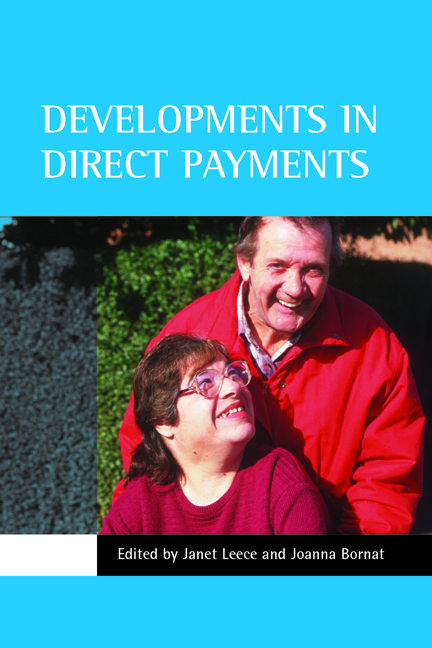Book contents
ten - Implementing direct payments: a support organisation perspective
Published online by Cambridge University Press: 18 January 2022
Summary
The legislation to enable direct payments as an alternative to service provision was a prize long fought for by disabled people and their organisations during the 1980s and 1990s. Nearly 10 years after the initial permissive legislation was introduced, how has the actual implementation of direct payments been experienced in practice? This chapter briefly reflects on some of the key issues from the perspective of an organisation run by and for disabled people.
First, a little background information. Glasgow Centre for Inclusive Living (GCIL) is a user-controlled organisation committed to promoting inclusive living by assisting disabled people to challenge barriers and make informed choices. Established in 1996 with a remit initially to support disabled people using indirect payments, GCIL now provides a range of inclusive living support, training, housing and employment services. With a total staff of around 30 and an annual turnover of over £950,000, GCIL is a genuinely user-led organisation – three quarters of the staff and directors are disabled people.
In 2004 GCIL secured the contract with Glasgow social work department to provide a support service to disabled people and others in Glasgow in receipt of direct payments. This supplemented existing contracts with two adjoining local authorities to act as an interim direct payments support organisation and to develop local user-led alternatives.
By and large the implementation of direct payments in Scotland has been much slower and more difficult to achieve than appears to be the case south of the border (see Witcher et al (2000); Pearson (2004); and Pearson in Chapter Three of this book). GCIL's own experience certainly bears this out. Until recently, the emphasis in Glasgow has been on the indirect scheme which supported around 100 disabled people, but which has effectively remained frozen since 1996. Apart from a relatively small-scale pilot project with approximately 15 participants, which began in 2000, no new direct payments were issued in Glasgow until 2004. This, it must be remembered, despite the introduction of permissive legislation as long ago as 1997 and despite the availability of an existing user-led support organisation – GCIL (formerly the Centre for Independent Living in Glasgow) – which was ready, willing and able to provide the necessary support.
- Type
- Chapter
- Information
- Developments in Direct Payments , pp. 145 - 148Publisher: Bristol University PressPrint publication year: 2006

